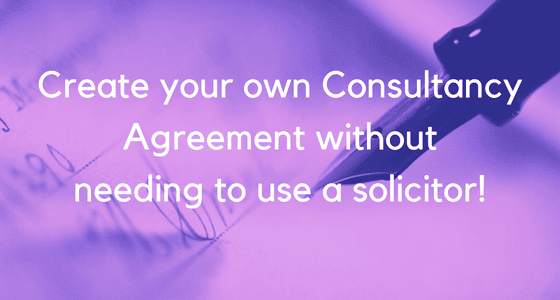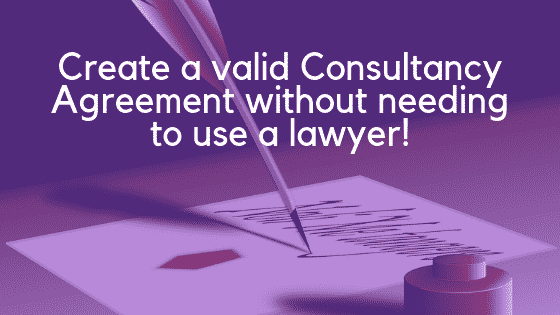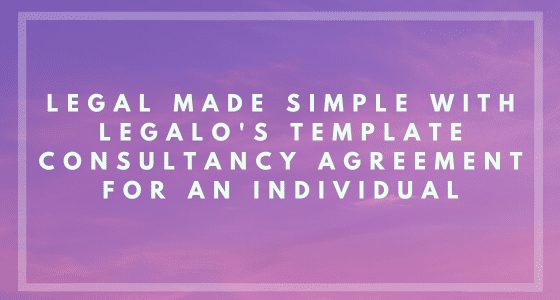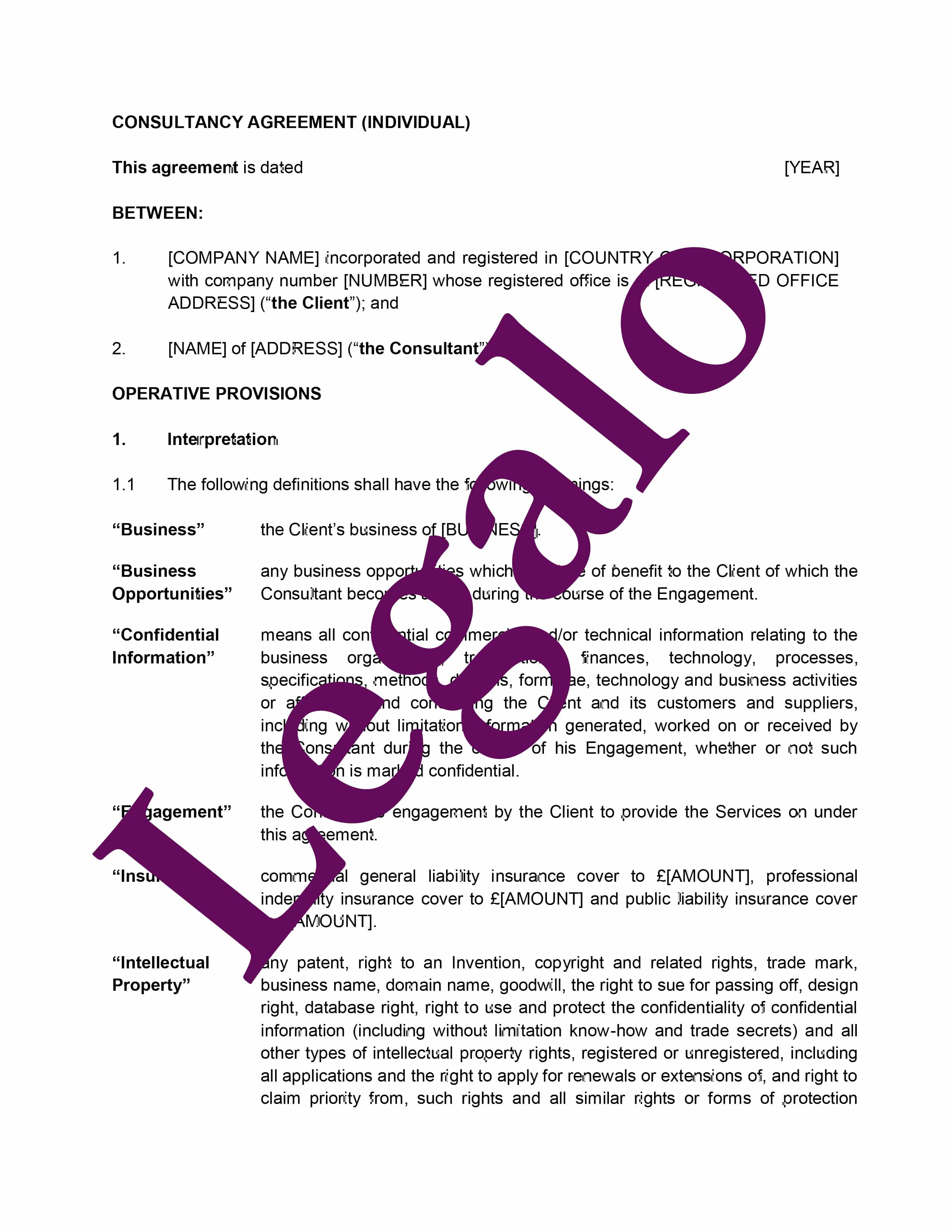Consultancy Agreement – For An Individual
Our Consultancy Agreement for an Individual template
- easy to use, yet detailed, consultancy agreement
- guidance notes in plain English
- use it where the consultant is an individual
- includes various options to help you get it right for you

How Does It Work?
-
1. Download
-
2. Edit
-
3. Print
-
4. Sign
MD, Legalo Ltd; Solicitor; Notary Public
This is our standard consultancy agreement template for use when you are taking on a consultant who is an individual (i.e. who is not trading via a limited company).
When to use our Consultancy Agreement template
This type of consultancy agreement puts in place a robust and detailed agreement that is for use by a business taking on a consultant who is:
- to be an independent contractor and genuinely not an employee; and
- an individual and is not operating via a company (including a “personal services company”).
You can adapt this consultancy agreement template to suit your individual requirements. It incorporates various options, so it is appropriate:
- whatever the nature of the services you supply;
- whether or not there is a right for the consultant to send a substitute on his or her behalf; and
- whatever the length of the contract: short-term, long-term, an indefinite term or a fixed term.
David, our co-founder and lawyer of over twenty years drafted this consultancy agreement template. David’s experience at expertise ensures that you buy an agreement template that is reliable and well drafted in plain English.
We also provide (included with the consultancy agreement download) a full set of guidance notes (free with the template). These notes offer a clause-by-clause explanation of the agreement. With the aid of the notes completing the final document simple and fast. A summary of the guidance notes are available here: guide to this template.
Using our Consultancy Agreement for an Individual template
This template for a consultancy agreement for an individual is available for download in Word format. After buying it, you can then edit it to suit your specific needs.
Legalo provide a no quibbles money-back guarantee to you in the event that you are not satisfied with your purchase for any reason.
Once bought, you can use the consultancy template for your own business as many times as you want. You will also get free updates to this template direct to your Legalo account, as and when we update the document. This ensures ongoing peace of mind.
How and when to use our template
The question of whether a worker is an employee or an independent contractor is not entirely up to the parties. The Employment Tribunal and HM Revenue and Customs both might have their own views on this. What you state in your consultancy agreement or employment contract is not conclusive. However, knowing what they look at, can help you to set up your arrangements in such a way that it is more likely the person is truly an independent contractor.
If you are in doubt as to whether the person would be properly classed as an employee or an independent contractor, you can use the tools on the HM Revenue website to help identify this: http://tools.hmrc.gov.uk/esi/screen/ESI/en-GB/summary?user=guest.
If you would like to see the full range of our employment templates or our commercial templates click the links.
FAQs on the Consultancy Contract for an Individual
Below, we have answered the top questions from the Internet on this subject.
What is the legal contract of consultancy?
A consultancy contract, also known as a consultancy agreement, is a written document that outlines the terms and conditions of a consulting arrangement between a consultant and a client or company. The basis of the contract is that the consultant is an independent contractor – not an employee. Fundamentally, this affects the tax status of the consultant, and to be valid it must be a genuine arrangement. The contract covers important aspects like the tax basis, scope of work, payment, confidentiality, termination, and other relevant details. The purpose of this contract is to establish a legally binding framework that defines the rights, responsibilities, and expectations of both parties involved in the consultancy engagement.
How do you write a consultancy agreement?
To write a consultancy agreement in the UK, you must include the following:
- Identify the Parties: Clearly state the names and contact information of the consultant and client.
- Define Scope of Work: Outline the services, tasks, and limitations.
- Establish Payment Terms: Specify the fees, payment schedule, expenses and who is responsible for paying the income tax due.
- Ensure Confidentiality: Include provisions to protect sensitive information.
- Address Termination: Outline conditions for ending the agreement.
- Dispute Resolution: Specify the preferred method for resolving conflicts.
- Responsibilities and Deadlines: Clearly define roles and set deadlines.
- Comply with UK Laws: Ensure compliance with relevant regulations, and in particular the HMRC guidance on whether the correct status is that of an independent contractor.
- Obtain Agreement: Share, review, and sign the agreement once all parties agree.
What should be included in a consultant agreement?
A consultancy agreement should cover the following:
- Contact information of involved parties.
- The basis of the contract being that of client and independent contractor.
- Detailed scope of work and project information.
- Clear payment terms with rates and schedule.
- Confidentiality and non-disclosure provisions.
- Termination and dispute resolution clauses.
- Ownership of intellectual property.
- Indemnification and liability limitations.
- Choice of governing law and jurisdiction.
- Signatures from both parties.
It is crucial to ensure a clear understanding of these terms to protect both the consultant and client. We recommend careful consideration of the factors that HMRC consider point to a genuine self-employed situation, to create a coherent and legally-valid agreement.
Is a consultancy agreement a contract?
A consultancy agreement in the UK is a contract. It can be signed as either a deed or a simple contract. While a deed offers certain legal benefits, such as a longer statute of limitations, most consultancy agreements are executed as simple contracts. This is because there is no legal requirement for them to be signed as deeds. The decision on which format to choose depends on the specific circumstances and the level of formality desired.
What is the difference between a consulting agreement and a contract?
A consulting agreement is a form of contract for an independent contractor. It is not an employment contract, as the consultant will have the status of being self-employed. The self-employment status is very relevant for both:
- tax status (for the payment of income tax and national insurance); and
- employment status (employment rights and protections, including sick pay, paid holidays, working time regulations, redundancy pay and protection from unfair dismissal).
So an independent contractor will:
- not have tax deducted by the client paying them (be paid gross);
- pay their own tax to HMRC bi-annually, complete their own accounts and tax returns to HMRC; and
- not have any employment rights or protections.
A consulting agreement is a contract that the parties tailor specifically to set out the terms of a consulting arrangement. It outlines the specific services the consultant will provide, the payment basis, and other relevant details relevant to the consulting engagement. In summary, a consulting agreement is a specialist type of contract created specifically for consulting services provided on a self-employed basis.
Do you need a contract to be a consultant?
While to work as a consultant, you do not always require a formal contract, we strongly recommend one. Given HMRC’s rigorous enforcement of PAYE tax deduction for employees, it is very important, if you want to have the status of being self-employed, that you have a good written contract that backs this status up. Having a written consultancy agreement helps to establish clear expectations, protect both parties involved, and define the terms of the engagement, thereby minimising the likelihood of disputes or problems with HMRC. While informal agreements may be possible, having a well-written contract is essential for legal and tax purposes.
How long should a consulting contract be?
It should be no longer than is properly required for the project concerned. The duration of a consulting contract varies depending on the project’s nature and scope. It can span from a few weeks for short-term projects to several years for long-term arrangements. The agreed-upon duration should consider the project’s complexity and objectives. It is crucial to clearly define the time-frame, as well as provisions for contract renewal or termination, in the agreement to prevent any misunderstandings. However, bear in mind that the longer the term or the closer to a full-time position it is, the greater the risk that HMRC consider it to be an employment situation.
What is the indemnity clause in a consultancy agreement?
The indemnity clause in a consultancy agreement is a provision where the consultant agrees to compensate the client for losses due to negligence, breach of contract, or legal violations. It allocates responsibility and financial liability in case of disputes or unforeseen events. You should clearly define the terms and conditions of the indemnity clause in the agreement to establish the scope and limits of indemnification. It is therefore important for the consultant to hold its own professional indemnity insurance against these risks.
Can I just call myself a consultant?
As a matter of marketing yourself, you can use the title “consultant” without formal qualifications, but possessing relevant expertise and skills in your field is essential. Clients value experience and knowledge when seeking consulting services. While there are no strict regulations, establishing credibility and providing valuable services are key to a successful consulting career. Obtaining certifications or qualifications can enhance your professional image and competencies.
As a matter of tax, by using the title “consultant” you are implying that:
- you are genuinely self-employed and
- not liable for the PAYE tax deductions that would apply to an employee.
So you need to ensure that (a) all aspects of the consultancy agreement and (b) how you work in practice back this up.
Can you terminate a consultancy contract?
Yes, you can terminate a consultancy contract, but the contract should clearly specify the terms and notice periods for termination. These terms include notice periods, conditions for termination, and the consequences that may arise from termination. Adhering to the contract’s termination provisions is important to prevent disputes. If any issues arise, it is advisable to follow the agreed-upon termination process outlined in the contract or seek legal advice to ensure compliance with relevant laws. Remember employment protections, such as statutory minimum notice periods, will not apply to a self-employed consultant.
Can anyone just make a contract?
In principle, anyone can create a contract, but for it to be valid and enforceable, it must meet legal requirements such as offer, acceptance, consideration, and a lawful purpose. To ensure compliance and protect the interests of all parties, it’s advisable to have contracts drafted:
- from a good template, such as those offered by Legalo; or
- by legal professionals, especially for complex or significant agreements.





